O. Reg. 723/94: RULES OF THE ONTARIO COURT (GENERAL DIVISION) AND THE ONTARIO COURT (PROVINCIAL DIVISION) IN APPEALS UNDER SECTION 116 OF THE PROVINCIAL OFFENCES ACT, Under: Courts of Justice Act, R.S.O. 1990, c. C.43
Courts of Justice Act
ONTARIO REGULATION 723/94
RULES OF THE ONTARIO COURT (GENERAL DIVISION)
AND THE ONTARIO COURT (PROVINCIAL DIVISION) IN APPEALS
UNDER SECTION 116 OF THE PROVINCIAL OFFENCES ACT
Consolidation Period: From December 12, 1994 to the e-Laws currency date.
No amendments.
This is the English version of a bilingual regulation.
CONTENTS
Rule | ||
1. 2. 3. 4. 5. 6. 7. 8. 9. 10. 11. 12. 13. 14. 15. 16. 17. 18. 19. 20. 21. 22. 23. |
Definitions and Interpretation Calculation of Time Notice by Mail Substituted Service Service and Filing of Notice of Appeal Appeal Where Fine Imposed Extension or Abridgment of Time Transcripts Recognizances Motions under Act or Rules Transmission of Material Intervention of Crown Attorney Listing of Appeal Directions Factums Appeal in Writing Dismissal of Appeal Abandonment of Appeals Appeal Respecting Release from Custody Official Examinations Special Commissioner Notice of Decision of Court Transition Forms |
|
DEFINITIONS AND INTERPRETATION
Definitions
“Act” means the Provincial Offences Act; (“Loi”)
“appeal court” means the Ontario Court (General Division) or the Ontario Court (Provincial Division), as the case may be, sitting as the appeal court under section 116 of the Act; (“tribunal d’appel”)
“clerk” means the clerk of the Ontario Court (Provincial Division) or the local registrar of the Ontario Court (General Division) to which an appeal is or may be taken under Part VII of the Act; (“greffier”)
“file” means file with the clerk; (“déposer”)
“judge” means a judge of the Ontario Court (General Division) or the Ontario Court (Provincial Division), as the case may be, sitting as the appeal court under section 116 of the Act. (“juge”)
Application of rules
(2) These rules apply in respect of appeals to the Ontario Court (General Division) or the Ontario Court (Provincial Division) under section 116 of the Act.
General principle
(3) These rules shall be construed liberally so as to obtain as expeditious a conclusion of every proceeding as is consistent with a just determination of the proceeding.
Matters not provided for
(4) Where matters are not provided for in these rules, the practice shall be determined by analogy to them. O. Reg. 723/94, r. 1.
CALCULATION OF TIME
General
2. (1) In the calculation of time under these rules or an order of the court, except where a contrary intention appears,
(a) where there is a reference to a number of days between two events, they shall be counted by excluding the day on which the first event happens and including the day on which the second event happens, even if they are described as clear days or the words “at least” are used;
(b) where a period of less than seven days is prescribed, holidays shall not be counted;
(c) where the time for doing an act under these rules expires on a holiday, the act may be done on the next day that is not a holiday; and
(d) service of a document made after 4 p.m. or at any time on a holiday shall be deemed to have been made on the next day that is not a holiday.
Local time
(2) Where a time of day is mentioned in these rules or in any documents in an appeal, the time referred to shall be taken as the time observed locally.
“Holiday”
(3) For the purposes of subsection (1),
“holiday” means,
(a) any Saturday or Sunday,
(b) New Year’s Day,
(c) Good Friday,
(d) Easter Monday,
(e) Victoria Day,
(f) Canada Day,
(g) Civic Holiday,
(h) Labour Day,
(i) Thanksgiving Day,
(j) Remembrance Day,
(k) Christmas Day,
(l) Boxing Day, and
(m) any special holiday proclaimed by the Governor General or the Lieutenant Governor.
Same
(4) Where,
(a) New Year’s Day, Canada Day or Remembrance Day falls on a Saturday or Sunday, the following Monday is a holiday;
(b) Christmas Day falls on a Saturday or Sunday, the following Monday and Tuesday are holidays;
(c) Christmas Day falls on a Friday, the following Monday is a holiday. O. Reg. 723/94, r. 2.
NOTICE BY MAIL
3. A notice or document given or delivered by mail shall, unless the contrary is shown, be deemed to be given or delivered on the seventh day following the day on which it was mailed. O. Reg. 723/94, r. 3.
SUBSTITUTED SERVICE
4. Where, on motion without notice, it appears to a judge that reasonable efforts have been made without success to give or deliver a notice or document in the manner required by these rules or the Act, or that reasonable efforts would not be successful, the judge may make an order for substituted service of the notice or document in such manner as the judge directs or, where necessary in the interests of justice, may dispense with the giving or delivery of the notice or document upon such terms as the judge considers proper in the circumstances. O. Reg. 723/94, r. 4.
SERVICE AND FILING OF NOTICE OF APPEAL
Notice of appeal
5. (1) A notice of appeal shall be in Form 1.
Time for service, appeal by defendant
(2) A defendant who appeals shall serve the notice of appeal on the prosecutor and, if the prosecutor is not acting on behalf of the Crown, on the Crown Attorney within 30 days after the date of the decision appealed from.
Time for service, appeal by prosecutor
(3) A prosecutor who appeals shall serve the notice of appeal on the defendant and, if the prosecutor is not acting on behalf of the Crown, on the Crown Attorney within 30 days after the date of the decision appealed from.
Filing
(4) An appellant shall file the notice of appeal with proof of service within five days after service.
Proof of service
(5) Proof of service of the notice of appeal may be made by affidavit.
Admission of service
(6) Where admission of service is endorsed on the notice of appeal, proof need not be made by affidavit. O. Reg. 723/94, r. 5.
APPEAL WHERE FINE IMPOSED
6. A defendant who appeals from a decision imposing a fine shall file with the notice of appeal a receipt for payment of the fine issued by the clerk of the court that imposed the fine, unless the clerk is satisfied that an order has been made under subsection 111 (2) of the Act and a recognizance has been entered into by the defendant in accordance with the order. O. Reg. 723/94, r. 6.
EXTENSION OR ABRIDGMENT OF TIME
Judge’s power
7. (1) A judge may extend or abridge the time for bringing an appeal and for doing any other act in connection with an appeal for which a time is prescribed before or after the expiration of the time prescribed.
Notice
(2) A notice of motion to extend or abridge time shall be given to the opposite party, unless otherwise directed by a judge. O. Reg. 723/94, r. 7.
TRANSCRIPTS
Certificate
8. (1) An appellant shall file with the notice of appeal a certificate of the clerk of the Ontario Court (Provincial Division) as to transcript of evidence in Form 2.
Filing and delivery of transcript
(2) An appellant shall file and deliver to the respondent,
(a) in an appeal against conviction, dismissal, a finding as to ability to conduct a defence or an order under section 161 of the Act, one copy of the transcript of evidence at trial, including reasons for judgment; and
(b) in an appeal against conviction and sentence or sentence only, one copy of the transcript of evidence at trial and submissions on sentencing, including reasons for judgment and sentence, if any.
Transcript to Crown Attorney
(3) Where the Crown Attorney has given notice of intervention after receiving notice of appeal, the appellant shall deliver a copy of the transcript of evidence at trial, including reasons for judgment and sentence, if any, to the Crown Attorney.
Time for filing certificate
(4) An appellant who has been issued a provisional legal aid certificate limited to the filing of a notice of appeal and making a motion for release from custody under the Legal Aid Act shall file a certificate in Form 2 within one month of filing the notice of appeal.
Deemed abandonment
(5) An appellant referred to in subrule (4) who does not file the certificate within one month of filing the notice of appeal or within such longer period of time as a judge may permit shall be deemed to have abandoned the appeal. O. Reg. 723/94, r. 8.
RECOGNIZANCES
9. (1) An order for recognizance and recognizance under section 110 of the Act shall be in Form 3.
(2) An order for recognizance and recognizance under section 111 of the Act shall be in Form 4. O. Reg. 723/94, r. 9.
MOTIONS UNDER ACT OR RULES
Notice of motion
10. (1) A motion provided for by the Act or these rules shall be commenced by a notice of motion.
Time for hearing
(2) There shall be at least three days between service of the notice of motion and the day for hearing the motion.
Time for filing notice
(3) The moving party shall file the notice of motion at least two days before the day for hearing the motion.
Evidence
(4) Evidence on a motion may be given,
(a) by affidavit;
(b) with the permission of the court, orally; or
(c) in the form of a transcript of the examination of a witness.
Power of judge
(5) Upon the hearing of a motion, the justice may receive and base his or her decision on information that the justice considers credible or trustworthy in the circumstances, whether or not other evidence is given.
Hearing where notice not served
(6) A motion may be heard without service of a notice of motion,
(a) on consent;
(b) where the motion is made under section 111 or 112 of the Act; or
(c) where, having regard to the subject-matter or the circumstances of the motion, it would not be unjust to hear the motion without service of a notice of motion.
Appeal by way of new trial
(7) A person making a motion for an order under section 127 of the Act that an appeal be heard and determined by way of a new trial in the court shall give at least seven days notice of the motion to all other parties to the appeal. O. Reg. 723/94, r. 10.
TRANSMISSION OF MATERIAL
s. 115 notice deemed given
11. (1) The clerk of the appeal court shall send a copy of the notice of appeal to the clerk of the Ontario Court (Provincial Division) as the notice required by section 115 of the Act.
Time for transmittal of documents
(2) The clerk of the Ontario Court (Provincial Division) shall transmit the order appealed from and transmit or transfer custody of the other material referred to in section 115 of the Act to the clerk of the appeal court within 10 days after receiving the copy of the notice of appeal. O. Reg. 723/94, r. 11.
INTERVENTION OF CROWN ATTORNEY
12. Where a prosecutor is not acting on behalf of the Crown, the Crown Attorney may intervene to act on behalf of the prosecutor or to attend as a party on the appeal. O. Reg. 723/94, r. 12.
LISTING OF APPEAL
Appeal list
13. (1) The clerk shall place the appeal on an appeal list for the next sitting of the court at which dates are fixed for hearing appeals as soon as 10 days have elapsed after,
(a) the clerk has received the order appealed from and the other material referred to in section 115 of the Act;
(b) the appellant has filed a copy of the transcript of evidence at trial, including reasons for judgment or sentence, if any; and
(c) any other step required by the Act, these rules or the court has been completed.
Notice period
(2) The clerk shall give at least 14 days notice of the date fixed for the hearing of the appeal to the appellant and the respondent and, where the Crown Attorney has filed a notice of intervention, to the Crown Attorney.
Motion under s. 127
(3) Where a motion is made under section 127 of the Act for an order that an appeal be heard and determined by way of a new trial in the court, the clerk shall not place the appeal on an appeal list until the motion has been disposed of and 10 days have elapsed since the disposition of the motion. O. Reg. 723/94, r. 13.
DIRECTIONS
14. A party to an appeal may make a motion to the court at any time for directions with respect to the conduct of the appeal. O. Reg. 723/94, r. 14.
FACTUMS
Where factum not necessary
15. (1) Unless a judge orders otherwise, a party to an appeal who intends to be present either personally or by counsel at the hearing of the appeal need not file a factum.
Form of factums
(2) Where a factum is required by order of the court or is filed by a party to an appeal, subrules (3) to (7) apply.
Appellant’s factum
(3) An appellant shall prepare an “Appellant’s Factum” not exceeding 10 pages in length, excluding the Schedule, and shall file , on or before the date specified in the notice of hearing given under rule 13, one copy of the factum, together with proof of service, on all other parties and persons who have been granted the right to be heard on the appeal.
Same
(4) Except in appeals from sentence only, the appellant’s factum shall consist of,
(a) Part I, entitled “Statement of the Case”, containing a statement identifying the appellant, the court in which the proceedings arose, the nature of the charge or charges, the result in that court and the nature of each order to which the appeal relates;
(b) Part II, entitled “Summary of the Facts”, containing a concise summary of the facts relevant to the issues on the appeal, with such references to the evidence by page and line, or paragraph, as the case may be, as may be necessary;
(c) Part III, entitled “Issues and the Law”, containing a statement of each issue raised, immediately followed by a concise statement of the law and any authorities relating to that issue;
(d) Part IV, entitled “Order Requested”, containing a statement of the order that the court is being asked to make; and
(e) a Schedule, entitled “Authorities to be Cited”, containing a list of the authorities, with citations, to which reference was made in Part III in the order in which they appear in that Part.
Respondent’s factum
(5) A respondent shall prepare a “Respondent’s Factum” not exceeding 10 pages in length, excluding the Schedule, and shall file, not later than 15 days after receipt of the appellant’s factum and not later than 7 days before the date fixed for the hearing of the appeal under rule 13, one copy of the factum, together with proof of service, on all other parties and persons who have been granted the right to be heard on the appeal.
Same
(6) Except in appeals from sentence only, the respondent’s factum shall consist of,
(a) Part I, entitled “Respondent’s Statement as to Facts”, containing a statement of the facts in Part II of the appellant’s factum that the respondent accepts as correct and those facts with which the respondent disagrees and a concise summary of any additional facts relied on, with such reference to the transcript evidence by page and line or paragraph, as the case may be, as is necessary;
(b) Part II, entitled “Response to Appellant’s Issues”, containing the position of the respondent with respect to each issue raised by the appellant immediately followed by a concise statement of the law and the authorities relating to that issue;
(c) Part III, entitled “Additional Issues”, containing a statement of any additional issues raised by the respondent, immediately followed by a concise statement of the law and the authorities relating to those issues;
(d) Part IV, entitled “Order Requested”, containing a statement of the order that the court will be asked to make; and
(e) a Schedule, entitled “Authorities to be Cited”, containing a list of the authorities, with citations, referred to in the order in which they appear in Parts II and III.
Paragraphs
(7) The appellant’s and the respondent’s factum shall be in paragraphs numbered consecutively throughout. O. Reg. 723/94, r. 15.
APPEAL IN WRITING
16. An appellant who intends not to be present in person or by counsel at the hearing of the appeal shall file, prior to the date of the hearing,
(a) a notice in writing of that intention, unless the appellant has already done so in the notice of appeal; and
(b) a statement in writing of the issues and the appellant’s arguments on the appeal. O. Reg. 723/94, r. 16.
DISMISSAL OF APPEAL
17. The court may dismiss an appeal where the appellant,
(a) does not attend in person or by counsel and,
(i) has not indicated in the notice of appeal the appellant’s intention not to be present in person or by counsel at the hearing of the appeal,
(ii) has not filed notice in writing of the intention not to be present in person or by counsel at the hearing of the appeal, and
(iii) has not filed a statement in writing of the issues and the appellant’s arguments on the appeal;
(b) has filed a notice of abandonment;
(c) has not filed a transcript of evidence at trial, including reasons for judgment or sentence, if any, within 30 days after receiving notice of completion of the transcript from the clerk of the Ontario Court (Provincial Division);
(d) after obtaining an order under subclause 117 (1) (b) (ii) of the Act for the examination of a witness, has not filed a transcript of the examination within 30 days after receiving notice of completion of the transcription from the other person before whom the witness was examined; or
(e) has failed to comply with an order of the court in respect of the appeal. O. Reg. 723/94, r. 17.
ABANDONMENT OF APPEALS
Notice of abandonment
18. (1) An appellant who wishes to abandon the appeal may file a notice of abandonment in Form 5.
Signing of notice
(2) The appellant or counsel for the appellant shall sign the notice of abandonment.
Signing by witness
(3) Where the appellant signs the notice of abandonment, the notice must also be signed by another person who witnessed the signing by the appellant.
Affidavit of execution
(4) Where the witness is not counsel for the appellant, the appellant shall file an affidavit of execution by the witness with the notice of abandonment.
Notice to other parties
(5) The clerk shall give a copy of the filed notice of abandonment to each of the other parties to the appeal. O. Reg. 723/94, r. 18.
APPEAL RESPECTING RELEASE FROM CUSTODY
Commencing appeal
19. (1) An appeal under section 152 of the Act in respect of release from custody shall be commenced by a written notice filed and given to all other parties and, if the Crown Attorney is not a party, to the Crown Attorney.
Grounds for release from custody
(2) On the appeal, the court shall order that the defendant be released from custody pending trial if it is satisfied that the defendant will attend in court for trial.
When order for release takes effect
(3) The court shall provide in the order that the order does not take effect until the defendant,
(a) gives an undertaking, either without conditions or with such conditions as the court may order, to attend in court for trial; or
(b) enters into a recognizance, with or without sureties, in such amount, with such conditions and before such justice as the court may order, either with or without depositing with the justice money or other valuable security specified by the court. O. Reg. 723/94, r. 19.
OFFICIAL EXAMINATIONS
Definition, “order”
“order” means an order under subclause 117 (1) (b) (ii) of the Act.
Presence of parties, counsel
(2) Except with the consent of the parties or their counsel, the examination of a witness under an order shall take place in the presence of the parties or their counsel.
Tentative appointment
(3) A party who intends to make a motion for an order for the examination of a witness before an official examiner shall obtain a tentative appointment for the examination before making the motion for the order.
Certificate of official examiner
(4) Upon completion of the examination , the party who made the motion for the order shall file a certificate of the official examiner in Form 6.
Notice of completion of transcript
(5) An official examiner who signs and delivers a certificate in Form 6 shall notify each of the parties to the appeal and the clerk when the transcript of the examination is completed. O. Reg. 723/94, r. 20.
SPECIAL COMMISSIONER
Appointment
21. (1) Where the court makes an order under clause 117 (1) (e) of the Act referring a question to a special commissioner for inquiry and report, the court shall, by order, appoint the special commissioner and fix the date on or before which the inquiry shall be completed and the report filed.
Motion for directions
(2) The special commissioner may make a motion to the court for directions in respect of the inquiry or the report, or both.
Filing of report
(3) Upon completion of the report, the special commissioner,
(a) shall file the report, together with one copy for each party to the appeal; and
(b) shall give notice of the filing of the report to each party to the appeal. O. Reg. 723/94, r. 21.
NOTICE OF DECISION OF COURT
22. Immediately after the disposition of an appeal, the clerk shall give notice of the court’s decision, including any written reasons and endorsements,
(a) to each party to the appeal who was not present in person or by counsel when the decision was made;
(b) to the clerk of the Ontario Court (Provincial Division); and
(c) to the Crown Attorney, where a prosecutor is not acting on behalf of the Crown. O. Reg. 723/94, r. 22.
TRANSITION
Definition, “preceding rules”
“preceding rules” means the Rules of the Ontario Court (General Division) and the Ontario Court (Provincial Division) in Appeals under Section 116 of the Provincial Offences Act (Regulation 196 of the Revised Regulations of Ontario, 1990) as they read on the day before these rules come into force.
Application of rules
(2) These rules apply to all appeals, whether commenced before or after these rules come into force, except in respect of steps taken under the preceding rules.
Power of judge
(3) Despite the repeal of the preceding rules and subrule (2), a judge may make an order that an appeal, or a step in the appeal, be conducted under these rules or the preceding rules or make any order that is considered just in order to secure the fair and expeditious conduct of the appeal. O. Reg. 723/94, r. 23.
24. Omitted (revokes other Regulations and provides for coming into force of provisions of this Regulation). O. Reg. 723/94, r. 24.
NOTICE OF APPEAL UNDER SECTION 116 OF THE PROVINCIAL OFFENCES ACT
Courts of Justice Act
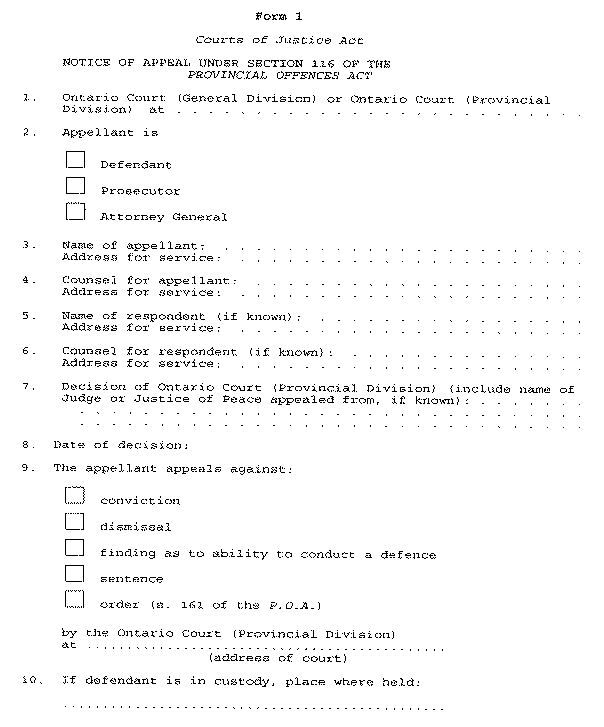
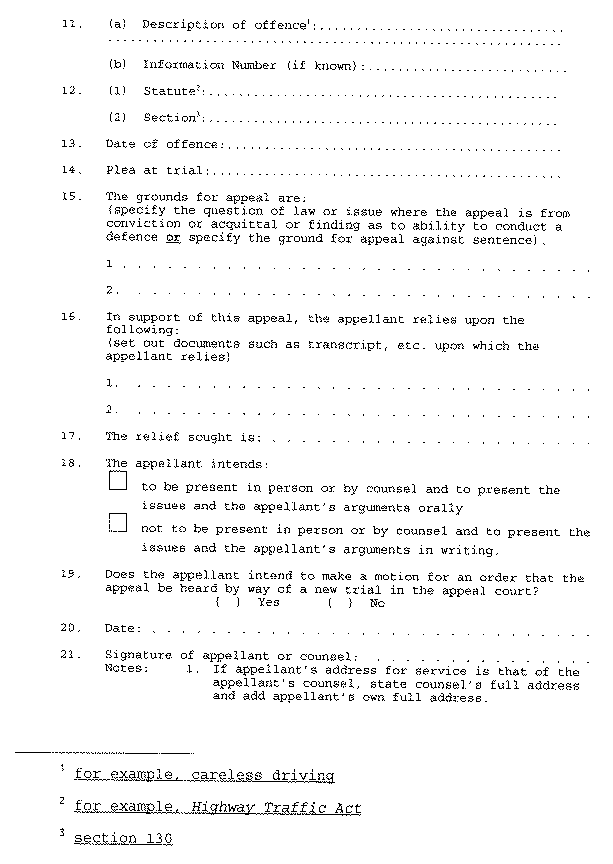

O. Reg. 723/94, Form 1.
CERTIFICATE OF CLERK OF ONTARIO COURT (PROVINCIAL DIVISION) AS TO TRANSCRIPT OF EVIDENCE
Courts of Justice Act
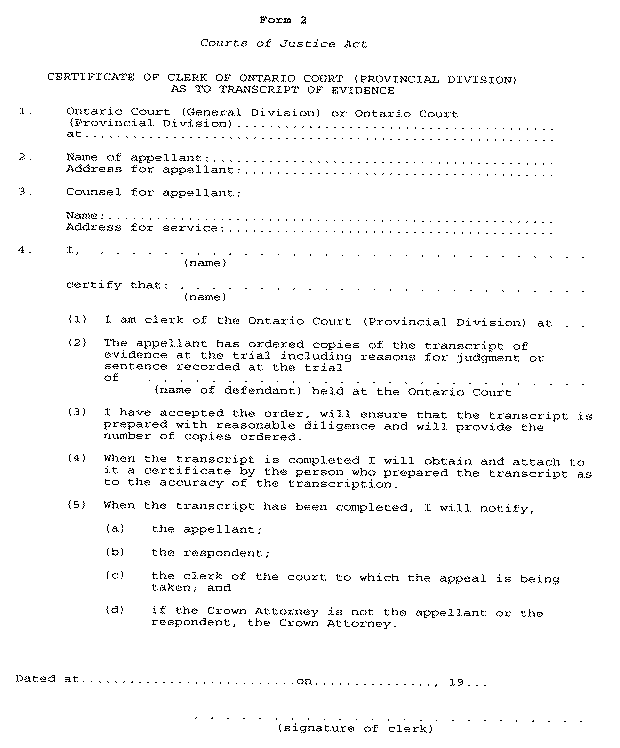
O. Reg. 723/94, Form 2.
ORDER FOR RECOGNIZANCE UNDER SECTION 110 OF THE PROVINCIAL OFFENCES ACT
Courts of Justice Act
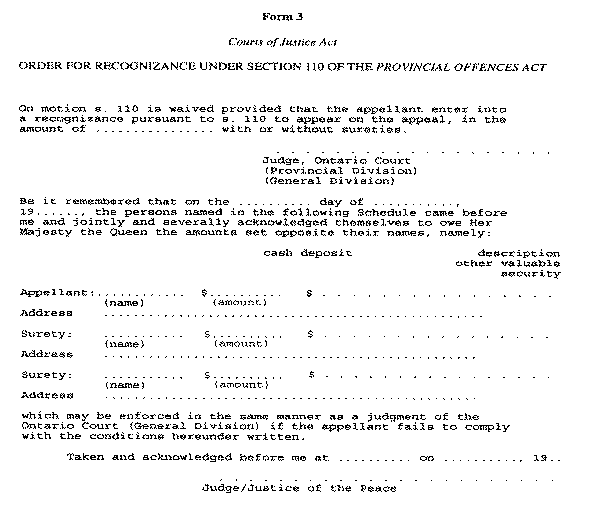
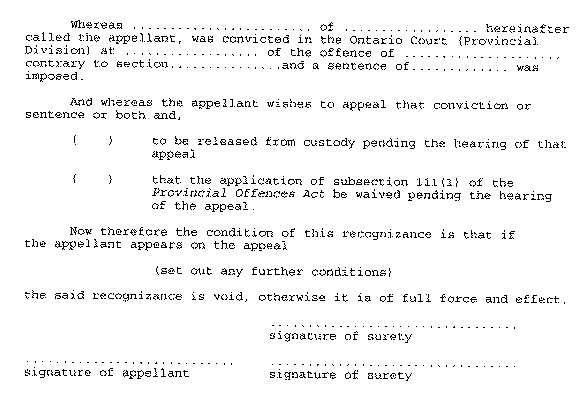
O. Reg. 723/94, Form 3.
ORDER FOR RECOGNIZANCE AND RECOGNIZANCE UNDER SECTION 111
Courts of Justice Act
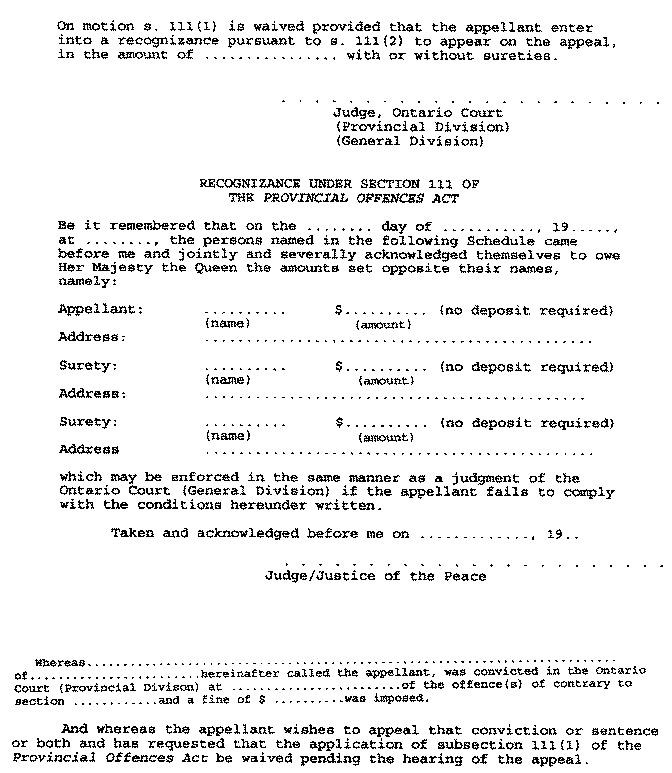

O. Reg. 723/94, Form 4.
NOTICE OF ABANDONMENT OF APPEAL
Courts of Justice Act
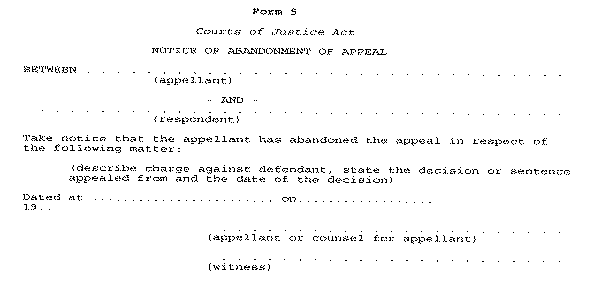
O. Reg. 723/94, Form 5.
CERTIFICATE OF OFFICIAL EXAMINER TO ONTARIO COURT (GENERAL DIVISION)
OR ONTARIO COURT (PROVINCIAL DIVISION)
Courts of Justice Act
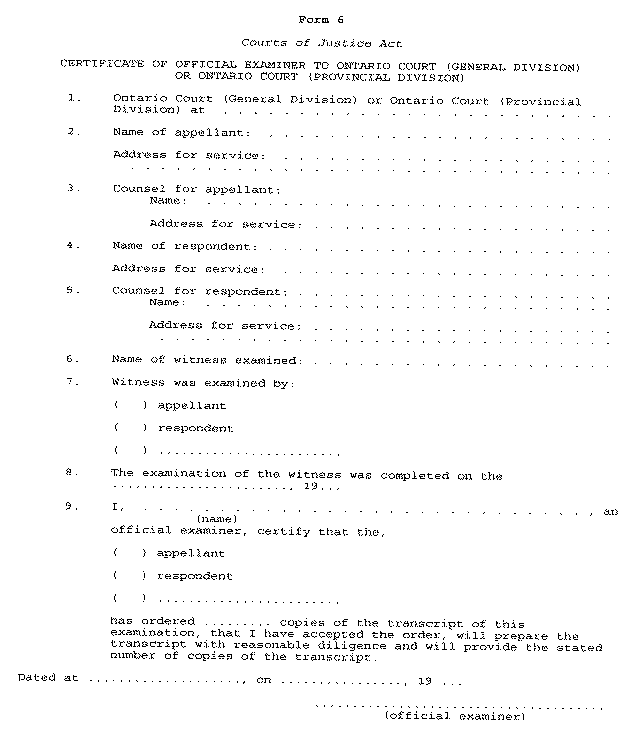
O. Reg. 723/94, Form 6.